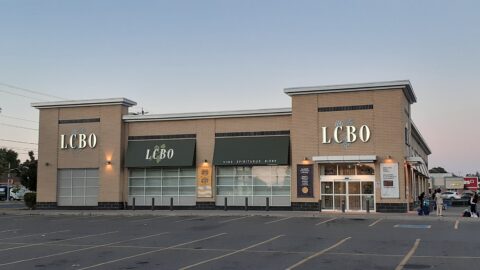A tentative deal was announced on Friday afternoon, then un-announced after the LCBO claimed the union had added financial demands to the return-to-work conditions after the contract itself had been agreed, and then on Saturday, re-announced. If the deal is ratified by the union, LCBO stores across Ontario should re-open on Tuesday.
It was the first LCBO strike in Ontario history, and it’s open to debate whether the union members will get all that much for their two-week unpaid break. The National Post‘s Chris Selley thinks not, calling it the “Stupidest. Strike. Ever.”

“LCBO at Parkway Mall” by Xander Wu is licensed under CC BY-SA 4.0 .
A week into the strike, a scant 15 per cent of Ontarians told Leger marketing that shuttered LCBO outlets had “affected (them) personally”. Only 29 per cent said they felt the government should legislate or arbitrate LCBO workers back into stores as soon as possible. Eleven per cent said they didn’t even know the strike was happening. And 32 per cent said they had explored “alternative locations” to buy booze, of which there are nowadays myriad.
Many more explored those opportunities in week two of the strike, I suspect, as fridges and wine racks were depleted. That’s potentially bad news for the LCBO’s future retail market share. But you didn’t even need an alternative to the LCBO: With a few days’ planning you could get all your regular brands delivered for free. Delivery and wholesale options were running as normal. Restaurants and supermarkets supplied by the LCBO were still supplied, and though there were reports of empty shelves at some supermarkets, that wasn’t truer than normal at the one I visit.
[…]
So this all looks like a terrible miscalculation by union leadership on behalf of its members — both a fundamental misreading of who had leverage, and a bizarre tactical choice to make the strike first and foremost about expanding the sale of ready-to-drink cocktails and seltzers (RTDs) to supermarkets and convenience stores.
Not wages; not benefits; not the number of full-time positions — things people can at least relate to — but where you can and cannot buy a White Claw or a Caesar in a can. Did they really think people would care?
Near as I can tell, it was an attempt to make this about the LCBO’s retail future: RTDs are a big and growing slice of the alcohol market in Ontario, only accessible (before the strike) at the LCBO. OPSEU wanted us to believe that by allowing supermarkets to sell them, Ontario would make no profit on them. And that’s their baked-in advantage: An incredible number of Ontarians, including far too many journalists, cannot wrap their minds around the notion of the government taking its cut at wholesale rather than retail.
Still, this gambit clearly fell flat.
Update: Fixed broken link to NP.



